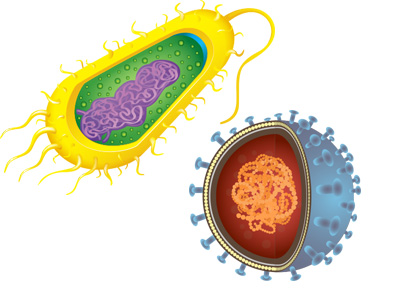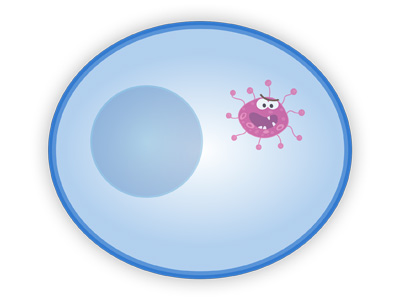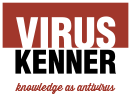LEARNING MATERIALS
What is a virus?
Viruses and bacteria
A virus is basically a smaller than small sized bit of genetic material, covered in a thin layer of proteins. A virus can do nothing on its own.
Viruses are often confused with bacteria, but bacteria are very different, tells virologist Dr. Schurink. First, bacteria are alive, while viruses are not. A bacterium is a single-celled organism that is self-sustaining. It can even reproduce by splitting itself in two – pretty weird! Bacteria are also extremely important to us. We carry around 1 kilogram of bacteria all over our bodies. Lots of them on our skin, but most of them in our gut. They help out in all manner of small ways, like our digestion and creating vitamins.
Some bacteria can make us sick however. This happens when bacteria end up in places where they shouldn’t be. They can enter your body through a cut in your skin for instance. Or you can ingest them when you eat food that went bad. When you’ve got a bacterial infection, this can be treated with antibiotics. Over time however, bacteria can adapt to antibiotics and become resistant to them. This is bad news, because bacteria can adapt quicker than we can research new antibiotics.


How do viruses work?
But let’s get back to viruses. Arwen Altenburg is a virologist at Viroscience who tells us viruses work like sneaky assassins. Viruses need host cells to stay alive. They infiltrate our healthy cells and take over their function. As soon as our innate immune system spots those infiltrated cells, it kicks into action and defends our body against the virus. It starts to create antibodies which attack the infiltrated cells to try and force the virus out. After the virus is defeated, our adaptive immune system does something really smart. It remembers how it defeated the virus, so that it can immediately eliminate the virus if it enters your body again in the future.
Vaccinations and our immune system
Wesley de Jong of the Travel Policlinic says this memory function of our immune system is why we can use vaccines to protect ourselves against viruses. During vaccination you get injected with a few inactivated particles of a virus. Enough for your innate immune system to recognize it as a hostile virus, but not enough to make you sick. Your immune system starts creating antibodies and this gets stored in your adaptive immune system. And that is how a vaccine helps to keep you safe from viruses.

